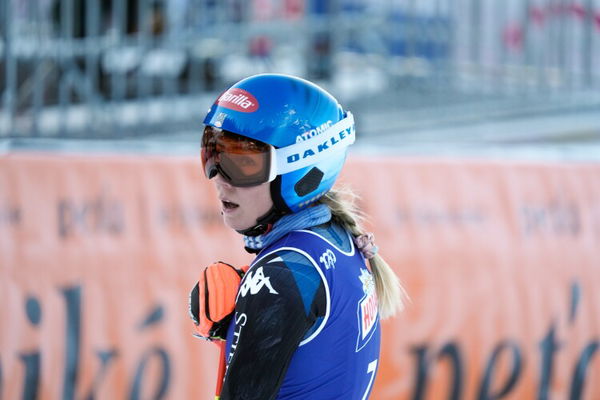

Killington, Vermont, November 30. Mikaela Shiffrin‘s home crowd, Mikaela Shiffrin’s chance to get the 100th World Cup win. She starts off great, and then she hits the snow. The greatest technical skier of all time slams into two gates before coming to a halt in the fencing. What followed were multiple injuries, including a puncture wound to the abdomen. Injuries to surgeries, to recovery, Shiffrin made it. She got the 100th win, and then she went for the lucky 101 on March 27, 2025. But the injury took its toll in more than physical ways. It attacked her mental well-being.
Episode four of season three of Moving Right Along was released on March 27, 2025, and was titled Intrusive Thoughts. The very first line of the video, “It’s been scary to experience these flashes of images of crashing, not knowing what they were when I was feeling them” revealed that she was fighting a different battle within her mind as she was trying to be her best on the snow. Mikaela was seen talking to her psychiatrist in the video on February 12. Based on Shiffrin’s description of how there was “almost a film over things”, her doctor told her that it was consistent with people who have experienced PTSD.
Now, while the doctor assured Shiffrin that it was not “a permanent diagnosis,” she also stressed on how it was crucial that she had the tools to comprehend and articulate her situation better. “And I think it’s important that we understand what’s happening and have words for it and continue to treat it and not just have it be some, ‘oh, I’m having difficulty coping’,” added the doctor. Shiffrin agreed.
ADVERTISEMENT
Article continues below this ad
Shiffrin opened up further.“These visions that I have skiing, they’re like these like flashes. They’re called intrusive thoughts.” And these flashes were not necessarily from Vermont, “And it’s not necessarily the crash from Killington, but it’s the same sort of experience, like the sort of tunnel vision, looking through goggles.” She even talked about her whole experience with it in the video.

She continued, “The course that I was training ahead of me was like every turn that I ski, I get a flash of myself crashing on that turn. And then you can imagine yourself blowing through the fencing, like crashing into the trees.” The fear of crashing inflicted serious damage on her confidence and forced her to “pull back and to not want to take on the speed.” These visions have drastically reduced, though. Recently she said that the episodes are less frequent now and that doing things that she was uncomfortable with has helped.
ADVERTISEMENT
Article continues below this ad
What’s your perspective on:
Is Shiffrin's battle with PTSD a turning point in how we view mental health in sports?
Have an interesting take?
Mental health struggles are not new to athletes. Simone Biles withdrew from multiple events at the 2020 Tokyo Olympics because she was suffering from what gymnasts refer to as ‘the twisties’—a mental condition in which the mind and body are not in sync, resulting in loss of spatial awareness while in the air. Later, when she was on the Gold Over America Tour, she revealed that she was not doing twists in shows and was “still scared to do gymnastics.” But much like how she came back and won the gold in Paris, Mikalea also did pick up speed eventually, winning races, getting to that century mark and now even beyond that.
101st for Mikaela Shiffrin
What do you do after you get a century of World Cup wins? Who would know other than Mikaela Shiffrin herself because she’s the only person who has done it. So what she did is she went for the 101st. If we were to look at all the seasons of her career, this one would be THE SEASON because, after winning the first two slalom races, she missed four of the 10 events in the discipline due to the Vermont injury. But what starts with a win ends with a win.
ADVERTISEMENT
Article continues below this ad
The Olympian went to the Women’s World Cup finals in Sun Valley on March 27, 2025. As if she just knew the snow there, she glided through the bumpy, technical course, clocking a combined time of 1:45.92. She was the fastest in the first run and finished 1.13sec over Germany’s Lena Dürr. This time difference was the largest she had this season in slalom; Slovenia’s Andreja Slokar came third.
This win guaranteed the Vermont native fourth place in the slalom standings. Given the races she missed, that is a pretty impressive feat. Now with 101st in the bag as well, how many more wins do you think Mikael Shiffrin will rack up?
ADVERTISEMENT
ADVERTISEMENT
ADVERTISEMENT
ADVERTISEMENT


Is Shiffrin's battle with PTSD a turning point in how we view mental health in sports?